Journey through biblical times to uncover the multifaceted concept of oppression and its enduring lessons for today's fight against injustice.

Define Oppression in the Bible
In the grand tapestry of biblical narratives, you'd almost think oppression was the preferred pastime of ancient civilizations, given its frequent mention.
Yet, defining oppression in the Bible isn't just about identifying the 'bad guys' in historical accounts or parables. It's about understanding a complex concept that weaves through laws, prophets' cries for justice, Jesus' teachings, and acts of liberation that resonate to this day.
By exploring these facets, you're not just uncovering what oppression meant back then; you're unlocking insights into how these ancient texts challenge and guide us in addressing injustice in our own time.
Let's embark on this journey together, shall we?
Key Takeaways
- Oppression in the Bible encompasses systemic injustices, economic hardships, and social stratifications enforced by societal norms and laws.
- Biblical narratives, including the Exodus story, illustrate the struggle against oppression and the pursuit of liberation and justice.
- Jesus' teachings prioritize compassion, challenge systemic injustices, and advocate for the marginalized, setting a foundation for Christian social justice.
- Biblical laws and parables advocate for protection of the vulnerable and promote ideals of equality, solidarity, and liberation from oppression.
Historical Context of Oppression
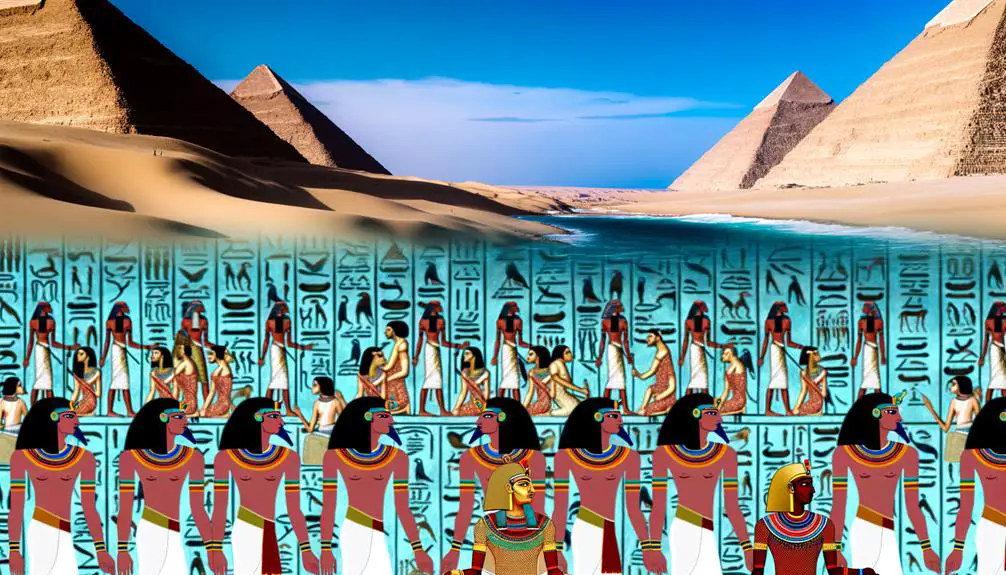
To understand oppression in the Bible, it's essential to explore its historical context, as societal norms and power dynamics of ancient times played a pivotal role in shaping these narratives. The stories you encounter, woven through the fabric of biblical texts, are deeply entrenched in the realities of their times. You'll find that societal hierarchies and Roman occupation were significant forces that contributed to the forms of oppression depicted.
Delving into the societal hierarchies, you see a world where one's position dictated their life's potential and limitations. These hierarchies weren't merely social constructs but were reinforced by religious and political laws. They determined access to resources, societal roles, and even one's worthiness in the eyes of the community. This stratification led to systemic forms of oppression, where those at the lower rungs of society faced insurmountable barriers to justice and equality.
The Roman occupation, a defining period for much of the New Testament context, introduces another layer. The Romans imposed their governance, military, and culture upon the regions they conquered, including Judea. This occupation exacerbated existing societal tensions and introduced new forms of oppression. The Jewish people, among others, found themselves under the yoke of an empire that demanded allegiance and tax, often leading to economic hardship and a loss of cultural and religious autonomy.
Analyzing these elements helps you grasp the multifaceted nature of oppression within the biblical narratives. It wasn't merely about individual acts of injustice but was rooted in broader societal and political systems that perpetuated inequality and subjugation. Understanding this context allows for a deeper comprehension of the biblical texts and the messages they convey about resilience, justice, and the human spirit.
Oppression in the Exodus Story
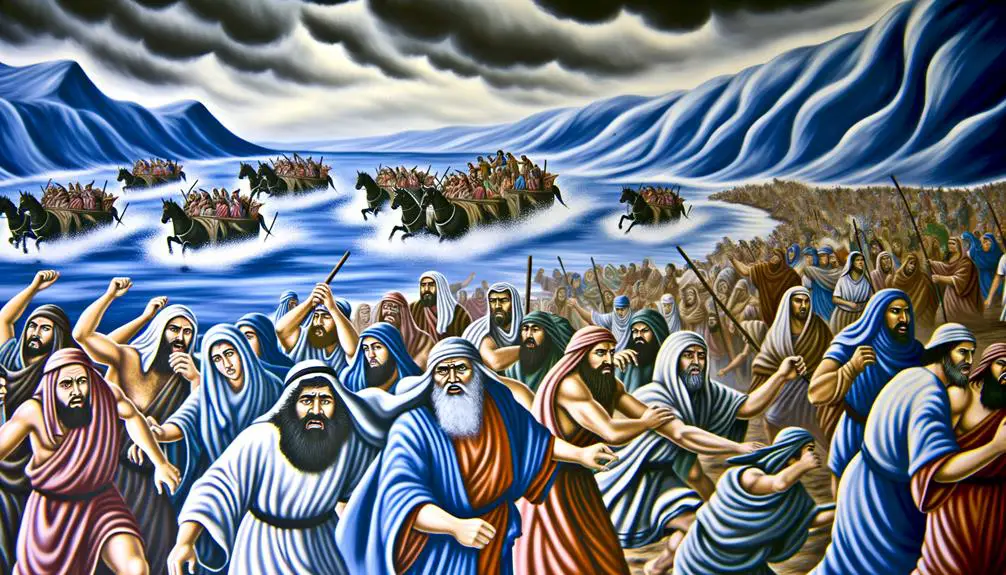
In the Exodus story, you encounter Pharaoh's harsh enslavement of the Israelites, a pivotal event that underpins the narrative's exploration of oppression.
Moses' divine mission, ordained by God, serves as a critical juncture, introducing the concept of divine intervention in the liberation of the oppressed.
The Israelites' arduous journey towards freedom not only symbolizes their physical liberation but also marks a significant moment in the broader discourse on oppression within the biblical context.
Pharaoh's Harsh Enslavement
Pharaoh's harsh enslavement of the Israelites, as detailed in the Exodus story, epitomizes systemic oppression and serves as a cornerstone for understanding biblical narratives of liberation. This episode isn't just a tale of suffering; it's a complex exploration of economic implications and cultural assimilation.
You see, Pharaoh's exploitation had a dual purpose: to bolster Egypt's economy through forced labor and to suppress Israelite identity, preventing any form of uprising. By erasing their cultural markers and exhausting them physically, Pharaoh aimed to assimilate the Israelites fully into Egyptian society, stripping them of their heritage and autonomy.
This strategy, however, didn't merely serve economic ends—it was a calculated attempt to obliterate the distinctiveness of the Israelite people, showcasing the depth of their oppression.
Moses' Divine Mission
Moses' divine mission, as narrated in the Exodus story, marks a pivotal shift from the depths of oppression to the dawn of liberation for the Israelites. Transitioning from his shepherd life, Moses encounters God in the burning bush, receiving a divine mandate to lead his people out of Egypt.
This episode isn't merely a change in Moses' vocational direction but signifies a broader theological and sociopolitical turning point. The subsequent miraculous signs, including plagues that challenge Pharaoh's authority, underscore the divine endorsement of Moses' mission.
These events, set against the backdrop of Moses' erstwhile shepherd life, illustrate a profound transformation from an ordinary existence to a life dedicated to achieving divine purposes, highlighting a critical juncture in the narrative of liberation from oppression.
Israelites' Liberation Journey
Following the divine mandate received by Moses, the Israelites embarked on a journey of liberation, marking a significant chapter in the Exodus story where they confront and navigate through the complexities of oppression.
This narrative isn't just a tale of physical freedom but also delves into ethical dilemmas and challenges of cultural assimilation. As you analyze their journey, you'll find that the Israelites faced moral quandaries, particularly in how they interacted with and differentiated themselves from the Egyptians and other cultures.
Their pursuit of liberation wasn't solely about escaping physical bondage but also involved a critical examination of their identity and values amidst pressures of assimilation. This phase of their history serves as a profound exploration of freedom, ethics, and cultural integrity.
Prophetic Voices Against Injustice

Throughout the biblical narrative, prophets emerged as pivotal figures challenging societal injustices and calling for divine justice. These ancient voices weren't just historical figures; they were the moral compasses of their time, aligning closely with modern parallels where activists challenge systemic oppression. Their messages carry profound ethical implications, underscoring the timeless struggle against injustice and the enduring call for societal reform.
- *Isaiah's vivid imagery of peace and justice in a war-torn society, painting a future where swords are beaten into plowshares.*
- *Amos's stern rebuke against the exploitation of the poor and the corruption of justice, as relevant today as it was in ancient times.*
- *Micah's demand for justice, mercy, and humility from leaders and citizens alike, echoing the call for integrity in leadership today.*
- *Jeremiah's lament over his peoples' moral decay and his passionate plea for them to return to righteousness, mirroring modern calls for societal reflection and reform.*
These prophetic voices weren't just critiquing their own societies; they were setting a precedent for future generations to recognize and resist oppression. Their calls for justice transcend time, urging not just ancient Israel but also today's global community to examine the ethical implications of their actions and systems. As scholars and believers delve into these texts, they find not only historical accounts but also enduring principles that challenge us to confront injustice with the same fervor as the prophets of old.
Jesus' Teachings on Oppression
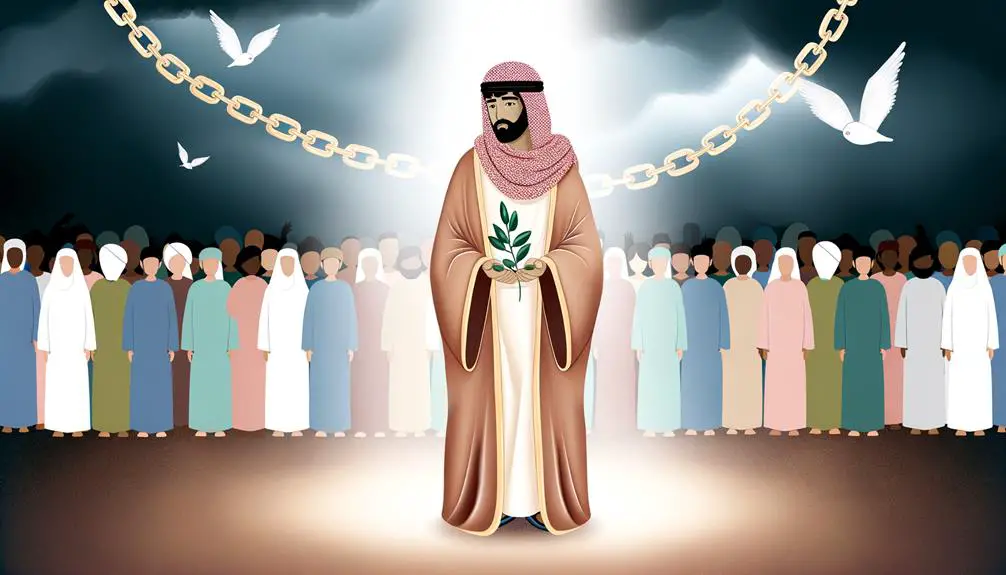
You'll find Jesus' teachings pivot significantly towards love and compassion, especially for the marginalized. His vocal stance against the oppressors and his affinity for the oppressed set a foundational precedent for social justice within Christian theology.
This analysis explores how these teachings not only condemned systemic injustices but also offered a transformative perspective on loving the downtrodden.
Loving the Oppressed
Jesus frequently emphasized the importance of loving the oppressed, situating this principle at the core of his teachings. His approach not only fostered modern empathy but also paved the way for societal integration, urging his followers to transcend societal barriers.
- Feeding the hungry: Reflecting compassion through basic human necessities.
- Healing the sick: Demonstrating love beyond mere words, addressing physical suffering.
- Welcoming strangers: Challenging social norms by embracing those marginalized.
- Visiting prisoners: Recognizing the humanity in everyone, regardless of their past.
Through these actions, Jesus modeled a holistic approach to love, illustrating that true empathy involves action. This narrative encourages you to actively participate in alleviating oppression, advocating for societal structures that prioritize the well-being of the most vulnerable.
Condemning Oppressors
While emphasizing love for the oppressed, Jesus also did not hesitate to speak out against the oppressors, offering a comprehensive view on addressing societal injustices.
Jesus' Condemnations |
Modern Parallels |
|---|---|
Denouncing greed |
Corporate exploitation |
Criticizing hypocrisy |
Political deceit |
Rebuking exclusion |
Social inequality |
Condemning exploitation |
Labor injustices |
Jesus' teachings carry profound ethical implications, urging you to recognize the oppressive structures within your society. His denunciations serve as a moral compass, guiding you towards justice and equity. By drawing parallels between biblical narratives and contemporary issues, you're invited to reflect on the enduring nature of oppression. Jesus' approach demands not only empathy for the victims but also a courageous stance against the mechanisms and individuals perpetuating injustice. This dual focus enriches your understanding of ethical responsibility in combating oppression today.
Parables Addressing Social Injustice
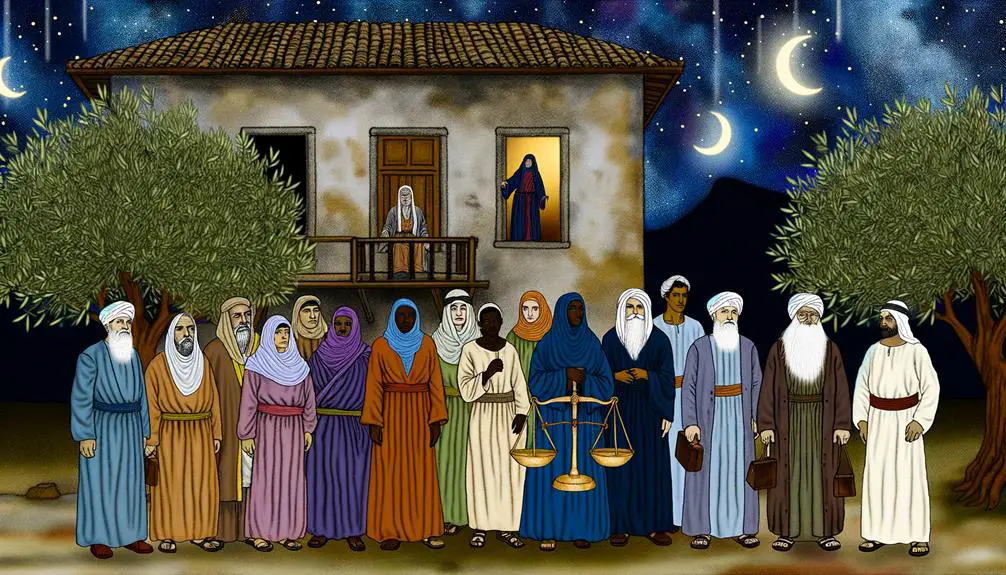
Several parables in the Bible directly confront issues of social injustice, offering profound insights into the ethical and moral dilemmas faced by individuals and societies. These narratives serve not only as spiritual guidance but also as a critique of societal norms that perpetuate inequality and oppression. By analyzing these parables, you uncover layers of meaning that challenge you to rethink your views on justice, compassion, and human dignity.
The parables addressing economic disparities and the call to Samaritan ethics are particularly poignant. They urge an introspection into personal and collective actions concerning the marginalized. These stories embody the essence of advocating for the oppressed and providing for the needy, encapsulating the broader Biblical mandate to pursue justice and mercy.
Consider these vivid images drawn from the parables:
- A traveler, beaten and left for dead, receives mercy from an unlikely Samaritan, challenging prevailing prejudices and promoting a universal ethic of compassion.
- Workers in a vineyard, hired at different hours, are paid equally, sparking debates on fairness, economic justice, and the kingdom of God's inclusive nature.
- A rich man, dressed in purple and fine linen, ignores Lazarus at his gate, illustrating the dangers of indifference and the call to see and serve the poor.
- A shepherd leaves ninety-nine sheep to find the one that's lost, symbolizing God's concern for the marginalized and the value of each individual.
These narratives invite you to engage with the principles of justice and equity, urging a reflection on your role in addressing and alleviating social injustice in your communities.
Laws Protecting the Marginalized

Throughout the Bible, numerous laws and directives specifically aim to protect and uplift the marginalized, embodying an ancient yet enduring call to social justice and equity. These mandates offer a blueprint for fostering economic equality and social solidarity, principles that are as relevant today as they were millennia ago.
At the heart of these biblical laws is the concept of economic equality. Leviticus 25, for example, introduces the Year of Jubilee, a revolutionary idea where every 50 years, debts are forgiven, and lands are returned to their original owners. This ensures that wealth doesn't concentrate in the hands of a few but is periodically redistributed, preventing long-term poverty and economic oppression. It's a direct challenge to systemic inequalities, demonstrating a divine preference for a society where everyone has enough.
Social solidarity is another key theme. Laws regarding the treatment of widows, orphans, and foreigners call for empathy and support for society's most vulnerable. In Deuteronomy 24:19-22, farmers are instructed to leave portions of their harvest for the poor, a practice ensuring that even the least among them have access to basic needs. This isn't just charity; it's a requirement for justice, underscoring the idea that a community's strength is measured by its care for the weakest members.
These biblical laws articulate a vision of a community where care for the marginalized is woven into the fabric of society. They challenge us to consider how our own communities might reflect these values of economic equality and social solidarity, pushing us towards a more equitable and compassionate world.
Acts of Liberation in Scripture
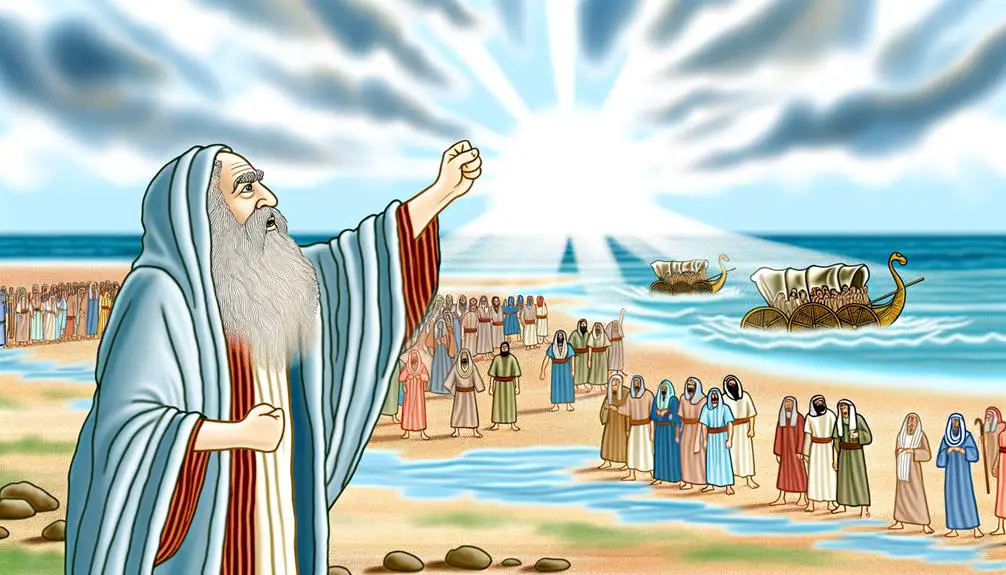
Building on the foundation of laws aimed at protecting the marginalized, scripture also presents compelling narratives of direct acts of liberation that further illustrate the biblical commitment to justice and equality. These stories aren't just ancient history; they offer modern parallels that challenge us to consider how spiritual emancipation and physical liberation intertwine in our pursuit of a just society.
Consider these acts of liberation in scripture:
- The Exodus: Perhaps the most iconic, this narrative recounts the Israelites' deliverance from Egyptian bondage, symbolizing God's power to liberate the oppressed and serving as a foundational story for understanding spiritual emancipation.
- The Release of Captives: Prophetic books like Isaiah speak of the liberation of captives, both as a literal freeing of prisoners and a metaphor for spiritual release.
- Jesus Healing on the Sabbath: Jesus' acts of healing on the Sabbath were acts of liberation from both physical ailment and societal marginalization, challenging the legalistic constraints of his time.
- Paul's Letter to Philemon: This epistle advocates for the emancipation of Onesimus, a slave, suggesting a radical rethinking of social hierarchies in the early Christian community.
Each of these narratives underscores a critical aspect of biblical teaching: liberation is both a physical reality and a spiritual principle. They suggest that acts of liberation aren't merely historical events but are ongoing processes that reflect God's desire for justice and equality.
As you reflect on these stories, consider how they resonate with modern efforts to combat oppression and promote spiritual and societal freedom.
Applying Biblical Principles Today
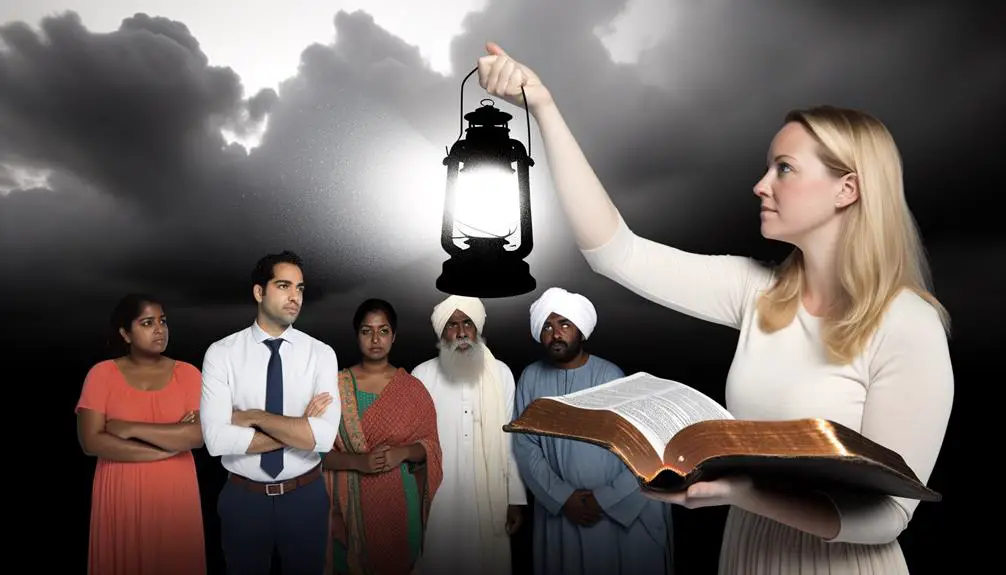
In today's world, applying biblical principles of liberation and justice requires a nuanced understanding of scripture's teachings within our complex societal fabric. You're tasked with navigating modern applications of these ancient texts, which often present ethical dilemmas that weren't explicitly addressed by the biblical authors. This process demands a critical, yet empathetic, approach to interpreting scripture in light of contemporary issues.
Consider the biblical mandate to care for the oppressed and the poor. In a global economy where the lines of responsibility are blurred by layers of corporations and international borders, determining how best to fulfill this mandate can lead you into intricate ethical dilemmas. You must discern not only what action to take but also weigh the potential consequences of those actions on a global scale.
Furthermore, the principle of justice, as depicted in the Bible, challenges you to advocate for equitable treatment of all individuals, regardless of their status or background. In practice, this means confronting systems of power and privilege that perpetuate inequality and injustice. It's a daunting task, requiring both courage and wisdom to navigate the often contentious political and social arenas where these battles are fought.
In engaging with these modern applications of biblical principles, you're also invited to participate in a broader dialogue about the role of faith in addressing the ethical dilemmas of our time. This engagement not only enriches your own understanding but also contributes to the collective effort to apply these timeless teachings in ways that promote liberation and justice for all.
Frequently Asked Questions
How Do Different Translations of the Bible Present the Concept of Oppression Differently?
Different Bible translations showcase the concept of oppression uniquely, underscoring the role of translation variance and cultural interpretation.
You'll notice that translators' backgrounds and the eras they lived in significantly influence how they perceive and convey oppression. This variance not only reflects linguistic choices but also the broader societal attitudes towards injustice and power dynamics.
Analyzing these differences gives you a deeper, more nuanced understanding of oppression's portrayal across cultures and times.
Are There Any Instances Where Biblical Figures Who Were Initially Oppressors Experienced Transformation and Became Advocates Against Oppression?
You're diving into examples where oppressors turned into advocates against oppression.
Take Paul's conversion, initially a persecutor of Christians. His dramatic transformation on the road to Damascus showcases a profound shift towards advocating for the faith he once tried to crush.
Similarly, Zacchaeus' restitution, after exploiting his role as a tax collector, reflects his commitment to rectify his oppressive actions.
Both examples illustrate significant transitions from oppression to active opposition.
What Are the Psychological and Emotional Effects of Oppression on Individuals and Communities as Depicted in Less Frequently Cited Bible Stories?
Imagine carrying a weight that bends your back but also deepens your roots, much like trees in a storm. The psychological and emotional toll of oppression on individuals and communities often mirrors this paradox.
Less frequently cited Bible stories reveal healing narratives and resilience strategies that emerge from such trials. These accounts provide a rich, analytical look at how oppression forges resilience, making communities stronger and more united in the face of adversity.
How Do Modern Theologians Reconcile Contradictions in the Bible Regarding Messages of Oppression and Liberation?
You're exploring how modern theologians tackle contradictions in biblical messages about oppression and liberation. They delve into theological interpretations, grounding their analyses in historical context. This approach helps you understand the evolving nature of these texts.
Theologians dissect passages, comparing ancient practices with today's morals. They argue that context is key, offering insights into the complex, sometimes contradictory, narratives, thereby enriching your grasp of biblical teachings on oppression and liberation.
In What Ways Do Non-Abrahamic Religions and Their Sacred Texts Address the Concept of Oppression, and How Do These Perspectives Compare With Those Found in the Bible?
You're exploring how non-Abrahamic religions tackle oppression.
Hindu Dharma analysis reveals concepts of karma and dharma addressing social inequalities, while Buddhist liberation teachings focus on overcoming suffering through enlightenment.
Compared to the Bible, these perspectives offer different frameworks for understanding and combating oppression, emphasizing individual spiritual growth and societal duties.
This comparative study highlights diverse religious approaches to addressing human suffering and social injustice, offering rich insights into global spiritual traditions.
Conclusion
In conclusion, the Bible's narrative arc bends towards justice, threading through the tapestry of ancient texts with a call to dismantle oppression. From Moses' liberation cry to Jesus' radical inclusivity, scripture champions the marginalized.
Yet, applying these age-old principles in today's digital age poses unique challenges. As you navigate the complexities of modern injustice, remember the prophetic voices of the past. They remind us that liberation isn't just a biblical ideal but a timeless mandate for humanity.



Sign up